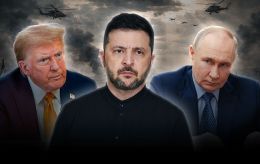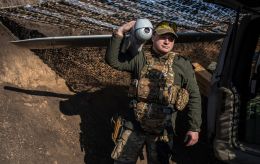In Trump's shadow: Agenda and Ukraine's expectations from NATO summit in Washington
 Volodymyr Zelenskyy and Jens Stoltenberg (photo: Getty Images)
Volodymyr Zelenskyy and Jens Stoltenberg (photo: Getty Images)
NATO leaders will gather for the last summit before a possible Donald Trump presidency and develop a strategy to protect against a possible change in US policy. One of its elements is a long-term commitment to Ukraine. Read about what will be discussed at the summit in Washington, what decisions will be made, and what Ukraine will get in the RBC-Ukraine article.
Contents
- Summit agenda
- Strengthening defense and deterring Russia
- Ukraine is one of the main summit's topics
- Insurance against turbulence in the United States
- NATO in the Indo-Pacific and additional arguments for Trump
At last year's NATO summit in Vilnius, the atmosphere was tense - Ukraine was expecting a political invitation to join the alliance. But this did not happen. This year, everything looks calmer: at least Ukraine is approaching the summit with more realistic expectations. The final documents are being prepared in advance, as is customary at events of this level, rather than being discussed amid the summit, as was the case in Vilnius. There may be even more practical results that will soon help Ukraine repel Russian aggression than last year.
However, the general mood in the United States is very disturbing. This summit is the last one that will occur before a possible change of power in the United States. According to American media reports, the alliance countries are already beginning to prepare for the possible coming to power of Donald Trump with his extreme skepticism about transatlantic cooperation. Therefore, in Washington, the allies will be trying to lay the most solid foundation for the foreseeable future of the alliance, which would protect it from future shocks. One of the elements of this work is to create a long-term policy of support for Ukraine that would not depend (to the extent possible) on Trump's unpredictable steps.
Summit agenda
Although the summit in Washington is being billed as an anniversary event will be celebrating the 75th anniversary of its founding-but there is little reason for the allies to celebrate. In recent years, NATO has been facing an increasing number of challenges.
While Ukraine is drawing back the main Russian forces, NATO is facing Russian sabotage of undersea pipelines, cyber-attacks, and GPS blocking for civil aviation and information operations.
So the summit in Washington will focus on three main topics. They were announced by NATO Secretary General Jens Stoltenberg at the end of May. These are strengthening defense and deterrence, supporting Ukraine's efforts to defend itself, and continuing to strengthen NATO's global partnership, especially in the Indo-Pacific region. All three points are interrelated and affect the level of assistance to Ukraine.
Strengthening defense and deterring Russia
NATO has been trying to strengthen defense and deterrence for a long time. At the Madrid Summit in 2022, the alliance adopted a new strategic concept that identified Russia as the main threat. A year later, in Vilnius, the Allies agreed on new plans to counter the Kremlin. This year, Washington will discuss the implementation of these plans. This means allocating additional financial resources, increasing weapons production, and deepening cooperation.
There have already been some successes in terms of defense spending. According to NATO itself, this year more than 20 member states will spend more than 2% of GDP on defense, and 5 alliance countries will spend more than 3%. Among the leaders are Poland, Estonia, the United States, Latvia, and Greece. Mostly Southern European countries and Belgium lag in terms of spending. However, even this achievement is considered insufficient by some countries. For example, Polish President Andrzej Duda calls for the 3% of GDP defense spending to be fixed for all NATO members.
As for increasing weapons production, NATO members will summarize the results of the Defense Production Action Plan, which was agreed upon a year ago in Vilnius. Allies will make new commitments to strengthen their industrial capabilities. Some results are already known.
According to the US representative to NATO, Julianne Smith, defense production in Europe has increased by about 40%, and the US has also made significant strides forward. Before the full-scale Russian invasion of Ukraine, the United States produced about 14 thousand 155 mm ammunition per month, and now production has increased to 80 thousand per month.
However, the problem of planning and the ability to conclude long-term contracts remains unresolved. Without this, private arms manufacturers cannot plan investments, which are quite expensive.
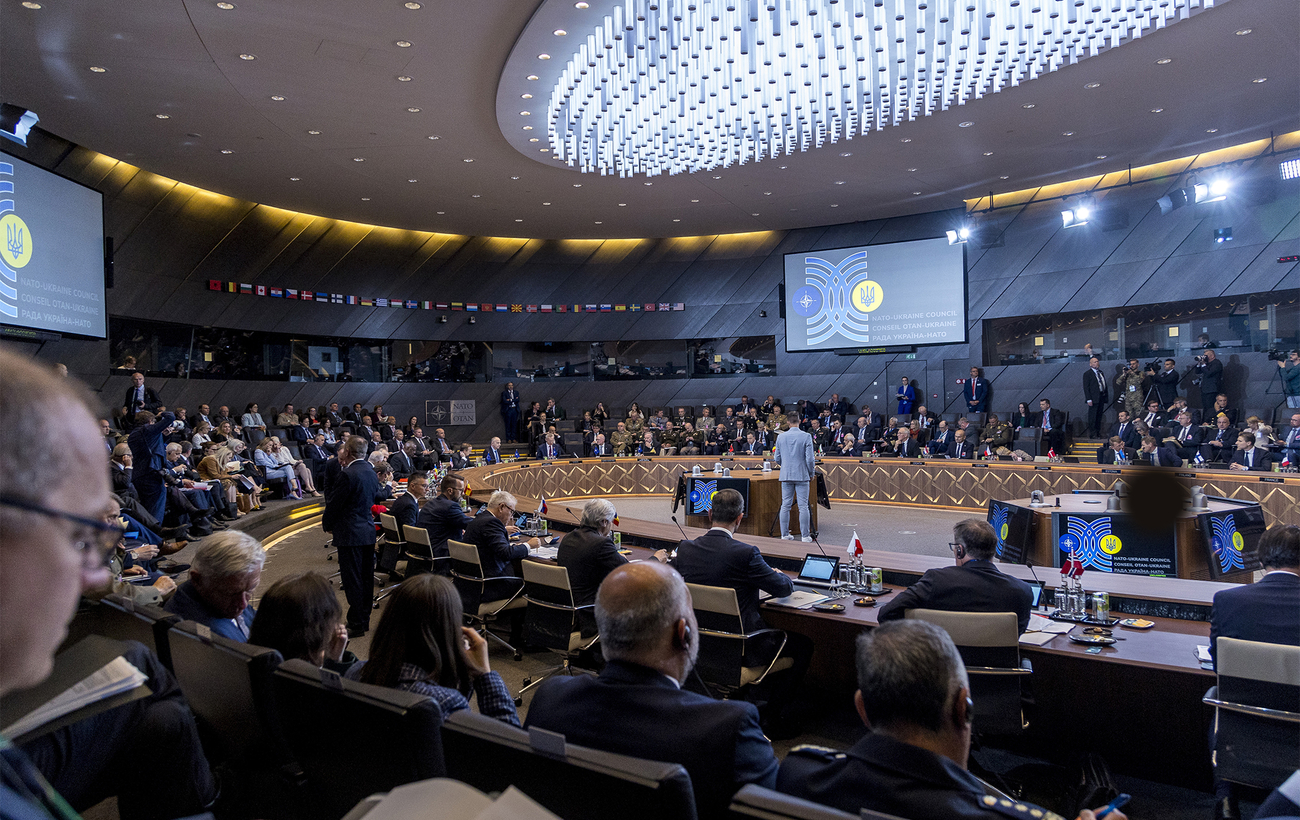 NATO Defense Ministers meeting on June 14 (photo: Getty Images)
NATO Defense Ministers meeting on June 14 (photo: Getty Images)
As a way out of the situation, NATO intends to create a platform to help formulate national arms production strategies, Euractiv reports. It is planned that alliance countries will commit to developing national plans and strategies to accelerate the growth of their defense industries. And the alliance itself will act as a transporter and facilitator to expand their capabilities.
NATO's defense posture also seems to be making progress. On June 14, NATO Defense Ministers preliminarily agreed on options for responding to Russia's hostile actions. Among other things, this includes enhanced intelligence sharing, increased protection of critical infrastructure, including underwater and cyberspace, and additional restrictions on Russian intelligence.
On June 14, Jens Stoltenberg stated that they currently had 500,000 troops on high alert in all areas of activity, which was well above the target set at the Madrid Summit in 2022.
The Allies will return to this agenda in Washington, DC, with a likely focus on protecting critical undersea infrastructure.
Ukraine is one of the main summit's topics
In all of these initiatives, Ukraine plays an extremely important role, de facto, already being part of NATO's eastern flank. That is, at the level of generals and Defense Ministers, everything is constructive. Some problems still arise at the political level.
"The problem for NATO is determination and political will. Unfortunately, my country, America, and this administration (Joe Biden - ed.) are very cautious in terms of supporting Ukraine's membership in NATO," Mark Wager, former Special Advisor for Russia and Eurasia at the US Army in Europe, tells RBC-Ukraine.
In any case, inviting Ukraine to join the alliance is out of the question - back in Vilnius, the United States and Germany made it clear that this is a red line for them, at least while the Ukraine-Russia war continues. However, not only Ukrainian but also American officials have repeatedly emphasized that in Washington, the wording on Ukraine's path to NATO will be updated and will reflect some progress.
In addition to this political gesture, the summit will also include some very practical things. Their overall goal is to make Ukraine an interoperable partner so that when the political moment comes, Ukraine's forces can integrate seamlessly into NATO, as happened with Finland and Sweden. This will be presented as a bridge to NATO membership for Ukraine, a phrase that should replace the already worn-out open-door membership phrase.
A key day for Kyiv will be July 11, when a meeting of the NATO-Ukraine Council is scheduled, as well as a meeting between the leaders of the countries that have signed security agreements with Ukraine and Ukrainian President Volodymyr Zelenskyy.
It is already known that Kyiv will receive new air defense systems. Their number and specific nomenclature will be revealed during the summit. Recently, Biden's team has been discussing the possibility of returning eight Patriot systems from Israel to be transferred to Ukraine. However, the success of this initiative now depends mainly on whether a full-scale war between Israel and Hezbollah militants will soon break out. Ukraine has also been conducting bilateral air defense talks with several European countries. The summit is also expected to result in some agreements with individual NATO members on the supply of other categories of weapons to Ukraine.
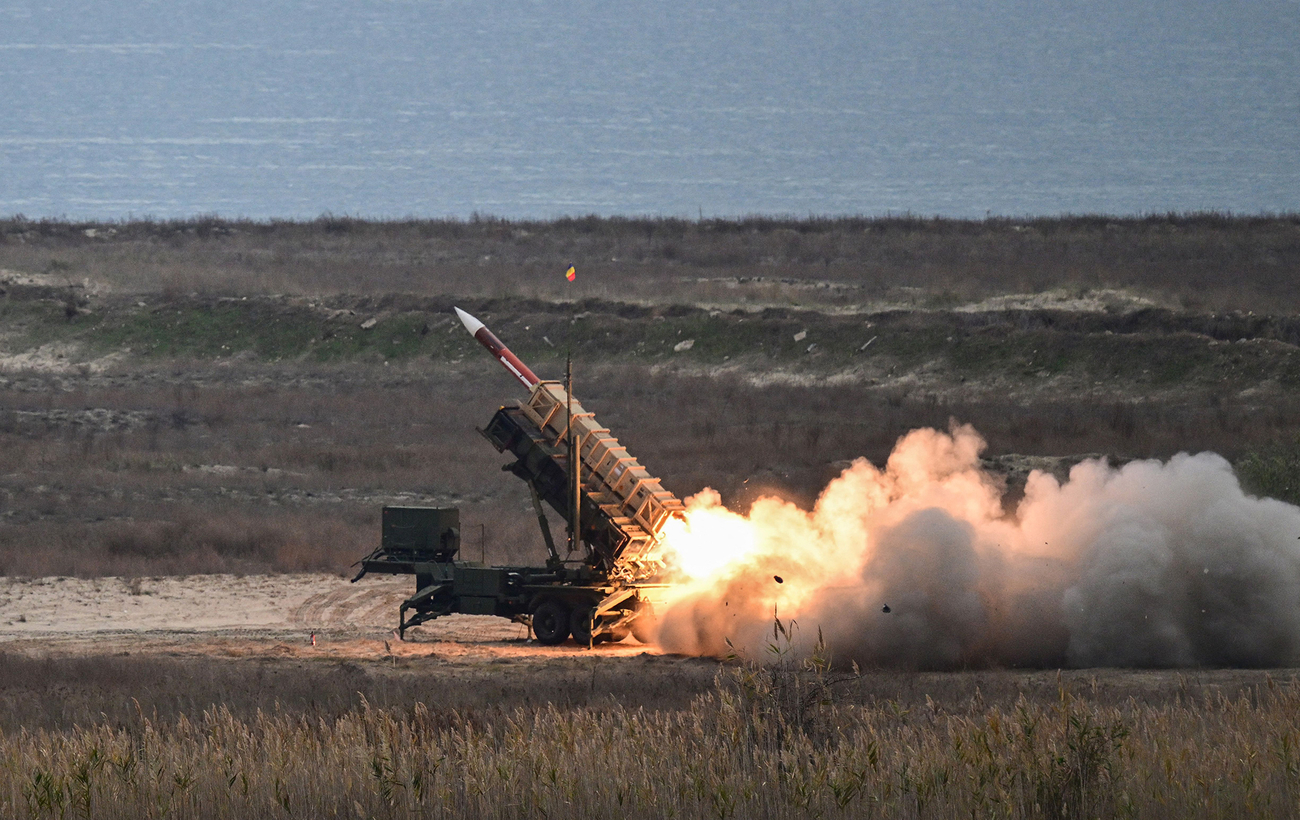 The Patriot system during a combat mission (photo: Getty Images)
The Patriot system during a combat mission (photo: Getty Images)
In addition, NATO leaders will sign a commitment to finance military assistance for Ukraine next year for 40 billion euros. The contributions of each country are planned to be proportional to its GDP (Hungary will be removed from the list of donors).
Earlier this month, NATO Defense Ministers confirmed the establishment of a new NATO command in the German city of Wiesbaden. It will coordinate training and security assistance to Ukraine. Until now, this role has been performed by the US-led Ramstein Group. The transfer of aid coordination to Ukraine under the NATO umbrella can also be seen as a defense strategy against Trump's arrival.
Insurance against turbulence in the United States
Such innovations are emerging right now for a reason. Although Joe Biden remains the formal host of the summit, Trump's shadow hovers over the meeting. The potential new US president regularly makes resonant and controversial statements about the security situation in the world and support for Ukraine.
So far, the two presidential candidates are neck and neck in the polls. However, amid the unsuccessful debate for Biden and talk of his possible withdrawal from the election, Washington's allies have more reason to worry about the future.
In addition, the unveiling of so-called Trump's peace plan, the diplomatic activity of Hungarian Prime Minister Viktor Orbán, and Bulgaria's intention to raise the issue of peace at the summit are symptomatic.
"This is a kind of safety net mechanism in case the new US administration suddenly blocks assistance to Ukraine in implementing the coercion to negotiate. Therefore, the fact that this is being transferred to a more expanded NATO format has its logic and will reduce some risks," Mykhailo Honchar, president of the Center for Global Studies "Strategy XXI," tells RBC-Ukraine.
However, these are all just in case measures, because no one fully knows Trump's true position. And whether he has one at all.
"The remarks that Trump had earlier when he was president, were demands that not only the United States should be the largest contributor, but that other countries should reach two percent, that they should pay the same for security," Hanna Hopko, former chairman of the Verkhovna Rada Committee on Foreign Affairs and head of the National Interests Advocacy Network, says in a commentary to RBC-Ukraine.
On the other hand, Trump's pain points psychological weaknesses, and inclinations are also known, and they are going to be exploited. In particular, his obsession with containing China.
NATO in the Indo-Pacific and additional arguments for Trump
The third item on the summit agenda concerns the situation in the Indo-Pacific region. Recently, Russia's close cooperation with North Korea has attracted the most attention. However, not all NATO members find this region equally important.
For the United States, the Indo-Pacific region is key in the context of containing China. For many European NATO members, it is a lower priority. For a long time, France has opposed the alliance's excessive activity in East Asia. President Emmanuel Macron has stated that NATO's scope of activities would then move too far away from its original North Atlantic focus. Because of France's position, for example, the NATO Liaison Office in Japan was never established.
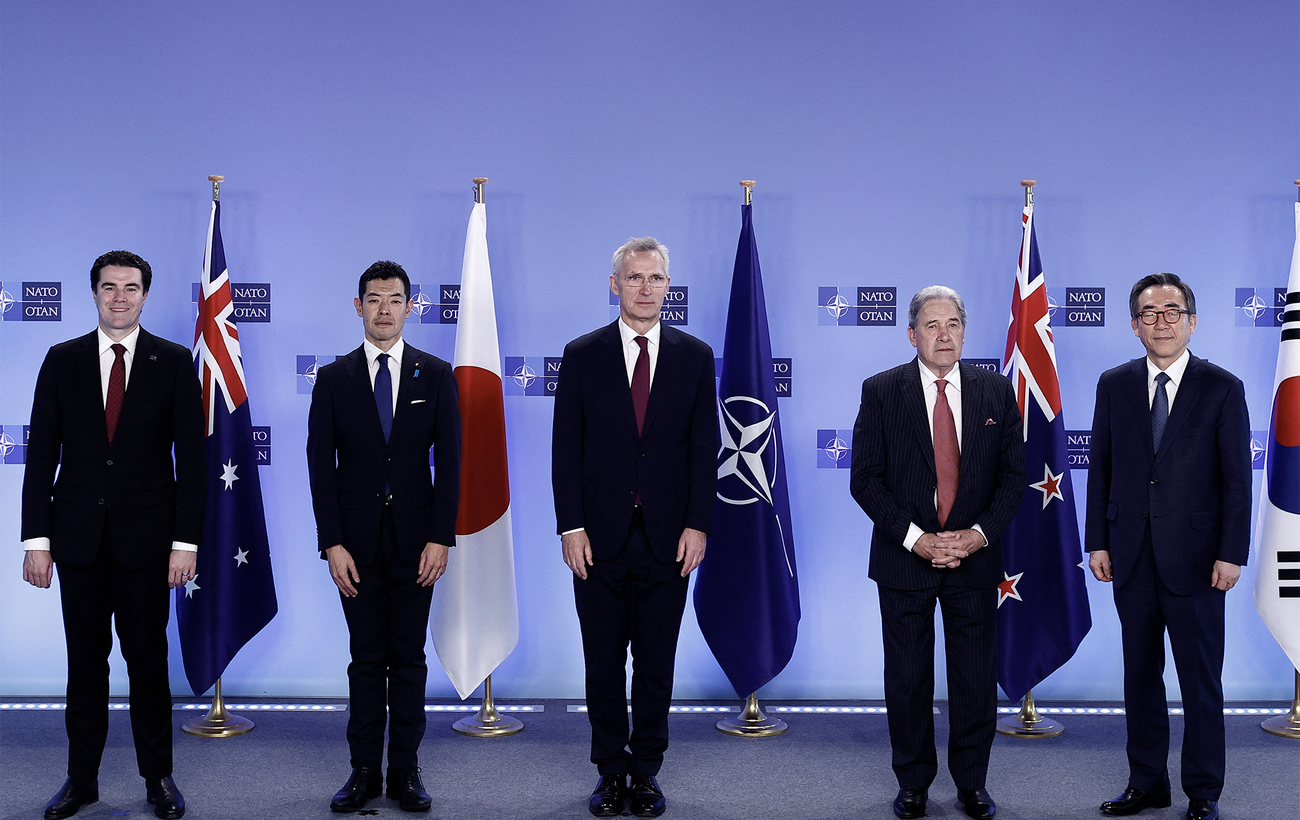 NATO Secretary General in the center and the foreign ministers of Australia, Japan, New Zealand, and South Korea (photo: Getty Images)
NATO Secretary General in the center and the foreign ministers of Australia, Japan, New Zealand, and South Korea (photo: Getty Images)
Thus, China has been mentioned in NATO's official documents since at least 2019. But little has been done at the alliance level. However, the situation is changing, not least because of the increase in the supply of Chinese dual-use goods to Russia.
NATO Secretary General Jens Stoltenberg described the situation by stating that NATO did not consider China an adversary but acknowledged that it challenged their values, interests, and security.
On the sidelines of the summit in Washington, NATO leaders are scheduled to meet with the leaders of Japan, South Korea, Australia, and New Zealand. On the agenda is the issue of Chinese aid to the Russian defense industry and how to prevent it.
European NATO members still do not plan active military and political efforts against China in the region.
"Of course, NATO has become a global organization, but many of the European member states are based on previous experience. Even though NATO helped the United States in Afghanistan, that mission ended in a fiasco. Therefore, the European members of the alliance are unlikely to be favorable to the deployment of activities in East Asia," says Mykhailo Honchar.
At the same time, European NATO members can influence China economically. For example, on July 4, the European Commission introduced temporary duties on imports of electric vehicles from China.
And in the future, such levers of European influence on China may be another argument for Trump. He says that the United States needs a strong NATO, including its European members.
"Trump sees China as a big threat. When he was President, he introduced various tariffs that hit the Chinese economy. Therefore, our task now is to show that a strong NATO is in the interests of the United States as a deterrent to China's geopolitical ambitions. And a strong NATO means that Ukraine is a member. Because we have the most professional army with a unique experience. It's cheaper for you to take Ukraine into NATO, cheaper to make NATO stronger than to create dozens of different alliances to counter China's future aggressions," Hanna Hopko tells RBC-Ukraine.
Thus, the Washington summit will bring a lot of concrete benefits to Ukraine, to further repel Russian aggression. However, progress will be moderate on the fundamental issue of NATO membership. As before, everything depends on the political will of the alliance member states, and consensus will be impossible without the consent of the United States and Germany. So, at least until the war with Russia is over, we should not expect any real breakthroughs. Although this may be a necessary but not sufficient condition.
Sources: NATO Secretary General Jens Stoltenberg, NATO reports, European and American media, Mark Wager, former Special Advisor to the US Army in Europe for Russia and Eurasia, Hanna Hopko, former Chairman of the Verkhovna Rada Committee on Foreign Affairs, Head of the National Interests Advocacy Network, and Mykhailo Honchar, President of the Center for Global Studies "Strategy XXI".
